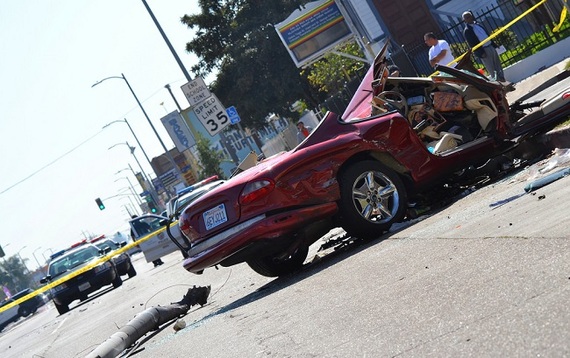The way tech is influencing cars is nothing short of fascinating. In the interest of making us all more safe, newer cars have head's up displays, proximity alerts, hand's-free parking and emergency braking. Back-up cams are standard equipment even on some economic cars. You can't even drive as fast as we did back in the 70s. Steering is more responsive and tires grip the road better.
Even with all these advances, road fatalities are on the rise. So what's going on?
The National Highway Traffic Administration (NHTSA) says their reporting system revealed a 4.4 percent jump in traffic fatalities, an alarming break in a general downward trend.
Some accidents can be attributed to older cars lacking in modern safety features, but the truth is, most fatalities are caused by our own bad behavior.
Distracted driving is one of the most prevalent dangers on the road. Fully one-third of U.S. drivers admit to checking their cell phones or sending messages while driving. The result? 341,000 accidents in 2013 attributed to texting.
As you might suspect, drugged and drunk driving play a huge part in the number of crashes and fatalities. Draconian DUI laws in many states don't seem to be curtailing incidents, and accidents involving prescription drugs are on the rise. Of fatally injured drivers, 57% tested positive for either alcohol or drugs in 2013.
Exhaustion is another undeniable factor. Driver fatigue was responsible for at least 72,000 accidents and 800 deaths...figures that may be drastically underestimated. Long distance truck drivers are at particular risk.
It's not all bad news.
Part of the sharp increase in traffic accidents is due to simple math. Falling gas prices and higher mileage means more mobility. According to the Federal Highway Administration, Americans drove more than 1.5 trillion miles in the first half of 2015. More people on the road is more opportunity for them to meet - and not in a good way.
Can technology save us from our own stupidity?
There's no easy answer. For now, most of the new safety features are pricey upgrades average drivers won't be able to afford for years and older cars continue to dominate the roads in lower income areas. It could be decades before effective safety features are in the majority of cars and trucks on the roads.
The truth is, no matter how safe responsible drivers try to make ourselves, we cannot control the actions of other drivers, road conditions, or hazards we will meet along the way. Even self-driving cars are not immune from crashes. While most are the fault of other drivers, in a recent disagreement with a bus, a Google self-driving car was deemed at fault. If machines with sensors can make mistakes, what chance do mere mortals have?
And the painful reality is, we don't always learn from past mistakes. Now that gas prices have fallen, guess what's soaring? If you guessed that great big gas-guzzling car sales are up and fuel efficient hybrids are down, you're exactly right. Think big SUVs are safer? Think again.
The high cost of stupid
Admittedly, it's a little hard to quantify the actual costs associated with car crashes. How much is a person's life worth? Can you put a price tag on the earning potential of a 20 year old college student killed in a car crash before she graduates engineering school? Not really, but the NHTSA did give it a shot. Their estimates, based on data from 2010, sets the yearly price tag at $871 billion in economic loss and societal harm.
For every crash, taxpayers are directly responsible for part of the cost. Roads, guard rails, light poles, and other tangible assets must be addressed. There's the high cost of investigation, deploying emergency vehicles to the scene, personnel necessary to reroute traffic, and cleanup at the scene. People at fault are often prosecuted at taxpayer expense. Spouses and children of victims qualify for Social Security, so we wind up supporting the survivors.
Preventable accidents are everybody's problem. Even if you're not involved, you're involved. And what you pay for some people to abuse the privilege of driving might surprise you.
Tech might eventually save us from ourselves. A future where we tuck ourselves into self-driving cars, set the GPS, and let the car estimate the best route, set the safest speed, and then navigate through a sea of other vehicles designed to maintain a safe proximity will minimize driver error. But we'll never be completely safe. Fog will interfere with sensors, wildlife to appear out of nowhere, and who knows? Probably sharknados. It wouldn't be the first time SciFi has predicted the future.

